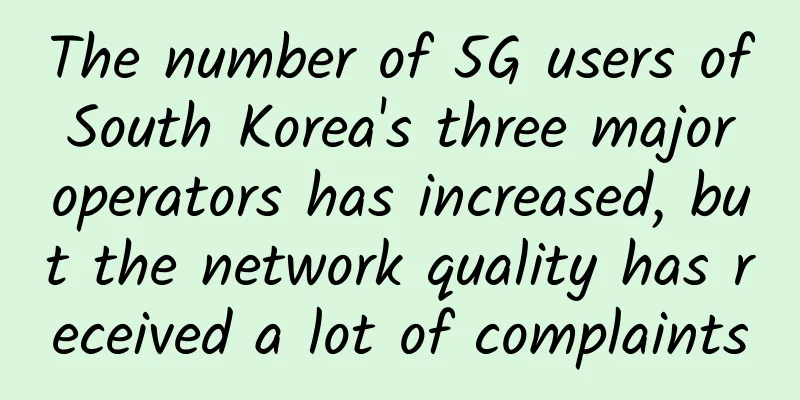The number of 5G users of South Korea's three major operators has increased, but the network quality has received a lot of complaints

|
According to data released by market tracker FnGuide on Monday, the total operating profit of South Korea's three major mobile operators in the fourth quarter is expected to achieve a double-digit increase to 813.5 billion won (about 4.34 billion yuan), of which SK Telecom is expected to be 342.6 billion won, KT is expected to be 253.6 billion won, and LG U+ is expected to be 217.3 billion won. Experts said the profit increase was mainly due to the growth in the number of 5G service users. According to data provided by the Ministry of Science and ICT, the number of 5G users of South Korea's three major mobile operators was 201.8 million as of November last year. Data shows that 27.8% of mobile service users in South Korea currently use 5G networks. Lee Seung-woong, an analyst at eBest Investment Securities, said: "As 5G users continue to increase, mobile operators' profits are expected to increase. In addition, the three companies have saved expenses by avoiding excessive marketing competition." Despite the strong user numbers, there are increasing complaints from users about the quality of 5G services. Due to insufficient 5G network coverage, many users often have to switch from 5G to 4G signals during use. According to a recent survey of 1,000 5G users by the local non-governmental organization Consumer Voice, Korean consumers received an average of 60.9G of 5G data packages from mobile operators, but the actual data usage was 31.1G. The survey showed that users did not use up 100% of their data packages due to insufficient 5G network coverage and lack of interesting content. The main reason for 5G network quality issues is the insufficient deployment of base stations. Due to the frequency used by 5G networks, it is difficult for radio waves to bypass obstacles, which requires mobile operators to deploy more base stations to provide high-quality 5G services. In addition, South Korea's three major mobile operators have slowed down their investment in network infrastructure construction. As of the third quarter of 2021, the three companies' total network infrastructure investment was 4.5 trillion won, down 9.9% from the same period in 2020. Regarding the quality of 5G networks, South Korean ICT Minister Lim Hye-sook has met with the CEOs of three companies and asked them to "expand network facility investment and improve 5G network quality." The CEOs of these companies responded that they would maintain a similar level of infrastructure investment as in 2020. |
>>: HTTPS - Why TLS 1.3 provides better performance and security?
Recommend
Understanding Observability and Opentelemetry in one article
√Introduction to Observability √Introduce the cor...
How to establish a performance testing strategy in a cloud environment
【51CTO.com Quick Translation】 Living in the prese...
V.PS: €5.95/month KVM-1GB/20GB/1TB/12 data centers available in the United States, Japan, Hong Kong, etc.
V.PS is a site under xTOM (founded in 2012). V.PS...
5G is not yet popular, 6G is on the way, and 7G will achieve space roaming
[[332143]] This article is reprinted from the WeC...
Tencent held the second Service Innovation Conference to implement the concept of "Service-oriented, Technology for Good"
On December 7, the second SICC Service Innovation...
Why is CDN technology essential to building the foundation of the metaverse?
The speed and convenience brought by the Internet...
What will 5G replace?
[[411646]] What will 5G replace? 5G's lightni...
Industry rectification leads to closure of online storage
Another online storage company announced the clos...
Can't tell the difference between Wi-Fi and WLAN? Stop confusing them
Usually, we connect to WiFi when we surf the Inte...
Fast, intelligent, and secure cloud application delivery is the new trend in 2017! F5 invites you to start a more free cross-cloud journey
[51CTO.com original article] Cloud computing has ...
New Track and New Technology|Xinglan Technology was invited to participate in the "2022 API Security Innovation Salon Beijing"
On the morning of April 15, the "2022 API Se...
The Q1 quarterly reports of the three major operators are released, and mobile customers are losing
Recently, the first quarter results of the three ...
5G is evolving to be more secure than 4G
Some people say that 5G network speed is 10-100 t...
HPE Aruba Networking Launches Enterprise-Grade Private 5G Network to Simplify Deployment of Dedicated Cellular Networks
HPE (NYSE: HPE ) today announced the launch of HP...









